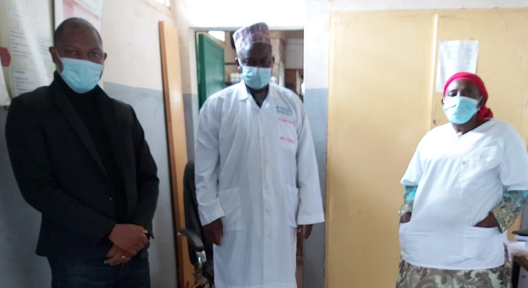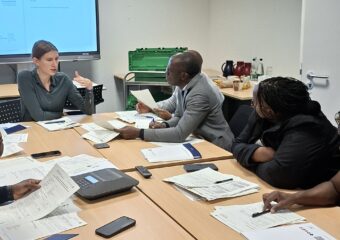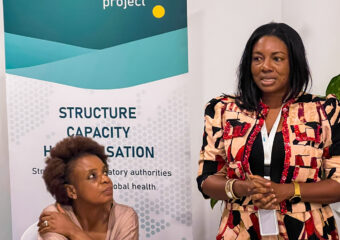Assessment and Strengthening of Healthcare Workers Preparedness to fight Against COVID-19
The RKI Partnership to Improve Patient Safety and Quality of Care (PASQUALE) has implemented the “WHO Multimodal Hand Hygiene (HH) Improvement Strategy” in Guinea and the Ivory Coast. PASQUALE aims to reduce healthcare associated infections by improving healthcare workers knowledge and compliance with HH, and by increasing the local production of hand disinfectant according to the WHO guidelines.

Since 2018 the RKI supports activities of the project PASQUALE towards the Improvement of Hand Hygiene (HH) to reduce nosocomial infections in two Partner hospitals in Guinea and Ivory Coast. The project functions internally as collaboration between the Centre for international Health Protection (ZIG) and Unit 14, “Hospital Hygiene and Infection Prevention and Control”. PASQUALE aims to reduce Healthcare associated Infections (HAI) by improving Healthcare workers performance on basic hygiene, focussing on HH. To improve the quality of care in the long-term, the local production of alcohol-based hand rub was introduced in 2019 according to the WHO recommendations.
The first step in strengthening the hospital’s preparedness to fight COVID-19 was to increase the local production in both partner hospitals in order to achieve continuous availability of alcohol based hand rub and to avoid disruptions from expensive imports from Europe or market stock outs.
Challenges in both partner countries were that shortage of raw materials and appropriate bottles for the production resulted in limited availability and increased costs.
In the Regional Hospital of Faranah (Guinea), PASQUALE supported the implementation of a triage zone to screen patients for COVID-19 symptoms according to national guidelines and case management. To assess healthcare workers’ (HCW) status of training on COVID-19 related infection prevention and control (IPC) measures, a survey to evaluate HCW’s knowledge and practise of IPC measures and the appropriate use of Personal Protective Equipment (PPE) according to WHO recommendations is planned and will be conducted in three phases: Baseline Assessment, Intervention, and Follow-up Evaluation.
A tailored training on IPC and COVID-19 transmission including a refresher on HH will be carried out after the identification of the HCW’s needs. Staff in selected Healthcare Centers on the primary care level will be included in the evaluation and training, as they are often the first point of patient contact.
In the University Hospital of Bouaké (Ivory Coast) a Follow-up on HCWs knowledge and practise on HH is in progress, including direct observation of HCWs performance. The results will be evaluated and further steps, such as the conduction of training on IPC/use of PPE will be discussed.
Date: June 2020



